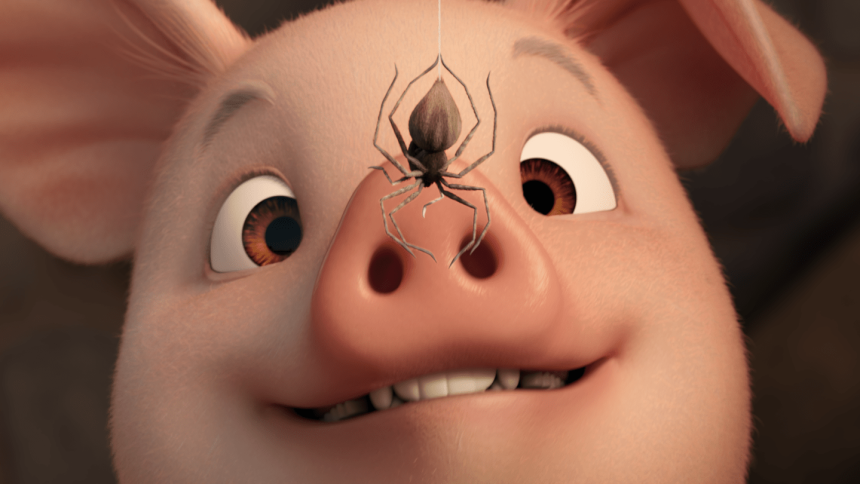‘Charlotte’s Web’ Review: Amy Adams and Elijah Wood Lead HBO Max’s Middling Adaptation of a Timeless Kid-Lit Classic
As classics of children’s literature go, E.B. White’s Charlotte’s Web sits near the very top of the pantheon. Since its publication, millions of youngsters have fallen for its vivid animal characters, its sweet but not overly sentimental depiction of rural life, its gentle yet honest lessons about friendship and change and death. I counted myself among its fans as a child, and I count myself among them again now as a grown-up: In rereading the book for this very review, I discovered its pleasures to be just as enduring as I’d hoped.
As adaptations of classics of children’s literature go, on the other hand, HBO Max’s new Charlotte’s Web seems unlikely to leave anything near such a lasting impression. The Sesame Workshop-produced three-part special is just okay, bogged down by drab CG animation, a starry but uneven voice cast and unnecessary plot padding. That it nevertheless finds its way to real poignancy by the end is a testament to the timeless power of White’s tale, more so than a credit to any of the choices being made here.
In the Yurie Rocha-directed cartoon, as in White’s original, the narrative revolves around the efforts to save Wilbur the piglet (voiced by Griffin Robert Faulkner early on and then Elijah Wood as he ages) from the bloody fate typical of livestock. (Here’s a hint: In one early scene, a plate of sizzling bacon sits on a table not three feet away from oblivious Wilbur.) The first rescue comes just hours after his birth, when a justice-minded little girl named Fern Arable (Natalie Chan) intervenes to keep her farmer dad (a rather stiff Tom Everett Scott) from killing the runt he figures will never amount to anything.
The second and more fanciful rescue comes some months later, after Wilbur has outgrown the Arables’ farm and settled into a bigger one down the road. Upon learning that Wilbur is almost certainly destined for the Christmas dinner table, his new best friend, a barn spider named Charlotte (Amy Adams), endeavors to “trick” the humans into changing their minds. She weaves webs adorned with compliments for Wilbur — “some pig,” “radiant,” etc. — hoping that if they believe he’s a miracle, they’ll be less inclined to eat him.
You Might Also Like
Though Fern is Wilbur’s first love, it’s really his friendship with Charlotte and the rest of his barnyard community that serve as the emotional core of Charlotte’s Web. Adams is a rock-solid choice for the arachnid, the wise and warm counterpoint to Faulkner’s wide-eyed and impressionable Wilbur. But Charlotte is not exactly her most inspired work; it’s the rare Adams role where it’s just as easy to imagine any number of other actors filling the slot.
At least Adams has more depth to work with than Keith David, Cynthia Erivo and Danny Trejo as some of the other assorted creatures, or Jean Smart as a possibly miscast narrator. (I say “possibly” because I can’t help but hear Deborah Vance, though I allow that this will be less of an issue for the target audience of children too small to have seen Hacks.) The only cast member who sounds like he’s really relishing his part is Randall Park, providing occasional comic relief as an ostentatiously selfish rat named Templeton.
The spotty quality of the voice work matches the unevenness of the animation from Toronto’s Guru Studios. The animals are rendered serviceably, with generically cute faces and pleasantly detailed if sometimes implausible textures. (Wilbur has a nice peach fuzz sheen, but Charlotte looks inexplicably made of wood and Templeton like he was dipped in glue.) It’s the humans who appear stilted, weightless and oddly waxy, as if crafted with the most cutting-edge animated software from 2007. Combined with farm backdrops so generic they might as well be stock images, Charlotte’s Web looks cheap, and not in a creatively scrappy way. Rather, it seems to be aiming for the big-budget, big-screen, big-studio gloss of Disney or Illumination, and simply coming up short.
Its expansions to the story feel similarly half-hearted. The animal side of Charlotte’s Web is bulked up with a few mildly amusing detours, including a chase through a junkyard and a journey into a hall of mirrors; while inessential to the storytelling, they’re fine enough as a way to entertain antsy kids or give the animators a break from creating yet another scene of a pig staring cross-eyed at a spider.
The additions to the human side are more consequential but less successful. Among them are a subplot about the sisterly bickering between Fern’s artsy aunt Edith (Rosario Dawson) and Fern’s mother Dolores (Ana Ortiz), a woman so grimly practical that when confronted with the sight of an unusually beautiful quilt, she sniffs that she prefers simpler pleasures like “getting your chores done, paying your bills on time [and] getting food on the table.” But the sweetness of that plot is undercut first by the fact that Dolores is, to put it plainly, a total drag, and then by a resolution that introduces the concept of racism late in the third act just so it can immediately shut it down without further exploration.
Still, by the time the story tiptoes to its bittersweet end, it’s hard not to feel for the pig who only ever wanted to get to live and love. Fern and Charlotte may be able to save Wilbur from his own death, at least for a while. But no one can protect anyone from the reality that change is simply a part of life — that even our fiercest friendships can come to an end, that we ourselves are forever in the process of transformation, that death touches all of us eventually, but that if we’re lucky, so might new lives and new loves. White’s Charlotte’s Web endures because all those facts remain as true and as difficult as they ever have, and HBO Max’s works to the extent it does for the exact same reason. If this new version can’t hold a candle to the original, it at least does nothing to dim its light.







